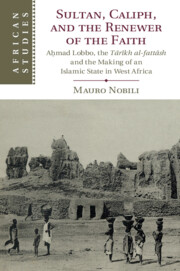 Sultan, Caliph, and the Renewer of the Faith
Sultan, Caliph, and the Renewer of the Faith from Part II - A Contested Space of Competing Claims
Published online by Cambridge University Press: 28 February 2020
This chapter explores the emergence of new the claims of authority on which Aḥmad Lobbo rested his role as a spiritual leader charged with the political power – a domain that had traditionally been a prerogative of the region’s warrior elites of Fulani, Bambara, and Arma origins. It first analyzes the writings of Aḥmad Lobbo to understand his project of religious reform. It then follows the unfolding of the events that translated the conflict between Aḥmad Lobbo and the religious establishment of the city of Djenné into an open war between his entourage and the old Fulani warrior elite in charge of political power in 1818. It concludes by showing that Aḥmad Lobbo’s authority was not only expressed through his demonstrable mastery of Islamic jurisprudence. He was also perceived as a Friend of God known for his access to Divine Blessing, or baraka.
To save this book to your Kindle, first ensure [email protected] is added to your Approved Personal Document E-mail List under your Personal Document Settings on the Manage Your Content and Devices page of your Amazon account. Then enter the ‘name’ part of your Kindle email address below. Find out more about saving to your Kindle.
Note you can select to save to either the @free.kindle.com or @kindle.com variations. ‘@free.kindle.com’ emails are free but can only be saved to your device when it is connected to wi-fi. ‘@kindle.com’ emails can be delivered even when you are not connected to wi-fi, but note that service fees apply.
Find out more about the Kindle Personal Document Service.
To save content items to your account, please confirm that you agree to abide by our usage policies. If this is the first time you use this feature, you will be asked to authorise Cambridge Core to connect with your account. Find out more about saving content to Dropbox.
To save content items to your account, please confirm that you agree to abide by our usage policies. If this is the first time you use this feature, you will be asked to authorise Cambridge Core to connect with your account. Find out more about saving content to Google Drive.